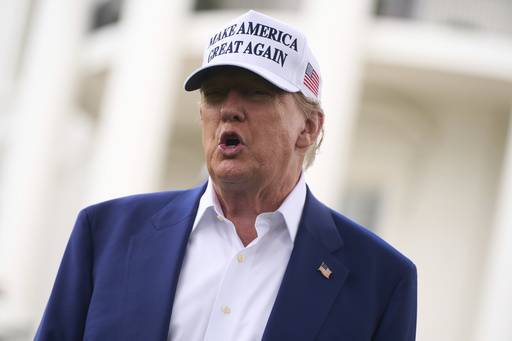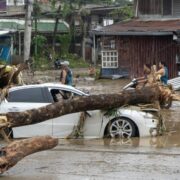Trump says he’ll decide whether US will directly attack Iran

BEERSHEBA, Israel—President Donald Trump said Thursday he will decide within two weeks whether the US military will get directly involved in the conflict between Israel and Iran, as the two sides attacked one another for a seventh day.
Trump has been weighing whether to attack Iran by striking its well-defended Fordo uranium enrichment facility, which is buried under a mountain and widely considered to be out of reach of all but America’s “bunker-buster” bombs. His statement was read out by White House press secretary Karoline Leavitt.
Earlier in the day, Israel’s defense minister threatened Iranian Supreme Leader Ayatollah Ali Khamenei after Iranian missiles crashed into a major hospital in southern Israel and hit residential buildings near Tel Aviv, wounding at least 240 people.
Israel’s military “has been instructed and knows that in order to achieve all of its goals, this man absolutely should not continue to exist,” Defense Minister Israel Katz said.
As rescuers wheeled patients out of the smoldering hospital, Israeli warplanes launched their latest attack on Iran’s nuclear program.
Prime Minister Benjamin Netanyahu said he trusted that Trump would “do what’s best for America.”
Speaking from the rubble and shattered glass around the Soroka Medical Center in Beersheba, he added: “I can tell you that they’re already helping a lot.”
‘Diplomatic solution’
Trump’s “two-week deadline” is a tactic he has used in other key decisions, including those involving Russia and Ukraine, and tariffs,” according to IG analyst Tony Sycamore.
“Often, these deadlines expire without concrete action, and there is certainly a risk of this happening again, given the complexities of the situation,” he said.
Meanwhile, a new diplomatic initiative appeared to be under way as Iran’s Foreign Minister Abbas Araghchi was scheduled to travel Friday to Geneva for meetings with the European Union’s top diplomat and counterparts from the United Kingdom, France and Germany.
“A window now exists within the next two weeks to achieve a diplomatic solution,” Britain’s foreign secretary David Lammy said on social media.
The open conflict between Israel and Iran erupted last Friday with a surprise wave of Israeli airstrikes targeting nuclear and military sites, top generals and nuclear scientists.
At least 657 people, including 263 civilians, have been killed in Iran and more than 2,000 were wounded, according to a Washington-based Iranian human rights group.
Iran has retaliated by firing 450 missiles and 1,000 drones at Israel, according to Israeli army estimates.
Most have been shot down by Israel’s multitiered air defenses, but at least 24 people in Israel have been killed and hundreds wounded.
Many hospitals in Israel, including Soroka, had activated emergency plans in the past week. They converted parking garages to wards and transferred vulnerable patients underground.
Cluster munitions
Israel’s Home Front Command asserted that one of the Iranian ballistic missiles fired Thursday morning had been rigged with fragmenting cluster munitions.
Rather than a conventional warhead, a cluster munition warhead carries dozens of submunitions that can explode on impact, showering small bomblets around a large area and posing major safety risks on the ground.
At least 80 patients and medical workers were wounded in the strike on Soroka Medical Center. Iranian officials insisted they had not sought to strike the hospital and claimed the attack hit a facility belonging to the Israeli military’s elite technological unit, called C4i.
Decline in attacks
Iran has long maintained its nuclear program is for peaceful purposes and has rejected calls to surrender or end that program.
But it is the only non-nuclear-weapon state to enrich uranium up to 60 percent—a short, technical step away from weapons-grade levels of 90 percent.
Israel is widely believed to be the only country with a nuclear weapons program in the Middle East but has never acknowledged the existence of its arsenal.
The Israeli air campaign has targeted Iran’s enrichment site at Natanz, centrifuge workshops around Tehran, a nuclear site in Isfahan and what the army assesses to be most of Iran’s ballistic missile launchers.
The destruction of those launchers has contributed to the steady decline in Iranian attacks since the start of the conflict.
Israeli airstrikes reached into the city of Rasht on the Caspian Sea early Friday, Iranian media reported.
The Israeli military had warned the public to flee the area around Rasht’s Industrial City, southwest of the city’s downtown.
But with Iran’s internet shut off to the outside world, it’s unclear if that warning had reached many people.
Hard line
Trump’s announcement of a decision in the next two weeks opened up diplomatic options, with the apparent hope Iran would make concessions despite suffering major military losses.
Tehran, however, has struck a hard line—at least publicly.
Iran’s supreme leader on Wednesday rejected US calls for surrender and warned any US military involvement would cause “irreparable damage to them.”
Parliament speaker Mohammad Bagher Qalibaf on Thursday criticized Trump for using military pressure to gain an advantage in nuclear negotiations.
“The delusional American president knows that he cannot impose peace on us by imposing war and threatening us,” he said.
















